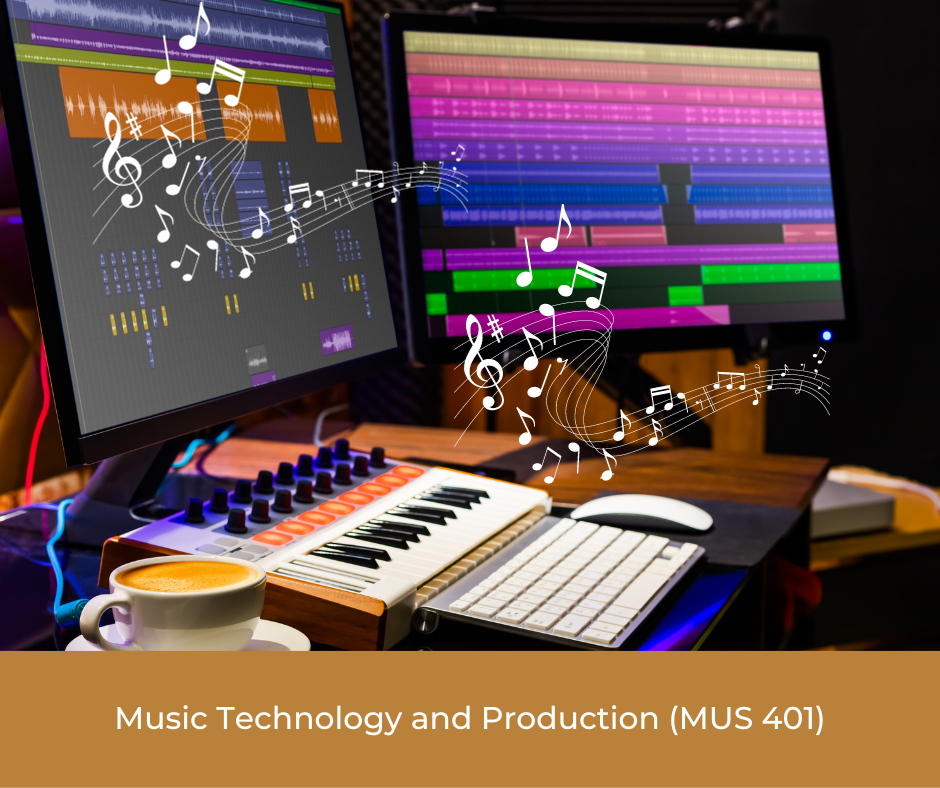Your cart is currently empty!
Music Technology and Production (MUS 401)

Course Description – Music Technology and Production (MUS 401):
MUS 401 is an advanced course designed to introduce students to the exciting world of modern music technology, including recording, mixing, and electronic music production. This course equips students with the knowledge and practical skills to harness cutting-edge tools and techniques used in the music industry. Students will gain proficiency in industry-standard software and hardware, empowering them to create, edit, and produce music of exceptional quality.
Outline of Major Content Areas:
- Introduction to Music Technology:
- Overview of music technology and its evolution.
- Understanding the role of technology in music production.
- Digital Audio Workstations (DAWs):
- Exploration of popular DAW software (e.g., Pro Tools, Logic Pro, Ableton Live).
- Hands-on experience in using DAWs for recording and editing music.
- Audio Recording Techniques:
- Techniques for capturing high-quality audio recordings in studio and live settings.
- Microphone selection, placement, and signal routing.
- Audio Mixing and Mastering:
- Principles of audio mixing, including balance, equalization, and effects processing.
- Mastering techniques to prepare music for distribution.
- Electronic Music Production:
- Introduction to electronic music genres and production techniques.
- Synthesis, MIDI sequencing, and sound design.
- Sound Engineering and Production Ethics:
- Best practices in sound engineering and ethical considerations in music production.
- Copyright and intellectual property rights in music technology.
- Live Sound Reinforcement:
- Techniques for setting up and operating sound systems for live performances.
- Troubleshooting common live sound issues.
- Music Technology in Context:
- Exploring how technology has influenced music composition, production, and distribution.
- Case studies of innovative music technology applications.
Course Learning Outcomes:
Upon successful completion of MUS 401, students will be able to:
- Proficiency with DAWs: Operate industry-standard Digital Audio Workstations for recording, editing, and producing music.
- Quality Audio Recording: Apply effective recording techniques to capture high-quality audio in studio and live settings.
- Audio Mixing and Mastering: Create well-balanced and polished music tracks through audio mixing and mastering processes.
- Electronic Music Production: Compose, arrange, and produce electronic music using synthesizers, MIDI sequencing, and sound design.
- Live Sound Expertise: Set up and manage sound systems for live performances, ensuring optimal audio quality.
- Ethical Considerations: Understand the ethical and legal aspects of music production, including copyright and intellectual property rights.
- Music Technology Integration: Recognize the impact of technology on music creation, distribution, and consumption.
Methods for Assessing Student Learning:
Student learning in MUS 401 will be assessed through a variety of practical and theoretical methods, allowing students to demonstrate their understanding and proficiency in music technology and production:
- Hands-On Projects: Students will complete hands-on projects involving recording, mixing, electronic music production, and live sound reinforcement.
- Quizzes and Examinations: Assessments will gauge students’ theoretical knowledge of music technology concepts.
- Portfolio Creation: Students will build a portfolio showcasing their music production and engineering skills.
- Class Presentations: Students may be required to present their projects and share insights with the class.
- Final Project: The course may culminate in a final music production project, where students apply their acquired skills to create an original piece of music.
These assessments will equip students with practical skills and knowledge to excel in the dynamic and technology-driven field of music production.